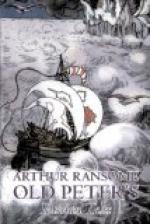But before their tears were dry the bad ones began to ask for the silver saucer and the transparent apple.
“No, no,” says the old man; “I shall keep them for ever, in memory of my poor little daughter whom God has taken away.”
So the bad ones did not gain by killing their little sister.
“That is one good thing,” said Vanya.
“But is that all, grandfather?” said Maroosia.
“Wait a bit, little pigeons. Too much haste set his shoes on fire. You listen, and you will hear what happened,” said old Peter. He took a pinch of snuff from a little wooden box, and then he went on with his tale.
Time did not stop with the death of the little girl. Winter came, and the snow with it. Everything was all white, just as it is now. And the wolves came to the doors of the huts, even into the villages, and no one stirred farther than he need. And then the snow melted, and the buds broke on the trees, and the birds began singing, and the sun shone warmer every dry. The old people had almost forgotten the little pretty one who lay dead in the forest. The bad ones had not forgotten, because now they had to do the work, and they did not like that at all.
And then one day some lambs strayed away into the forest, and a young shepherd went after them to bring them safely back to their mothers. And as he wandered this way and that through the forest, following their light tracks, he came to a little birch tree, bright with new leaves, waving over a little mound of earth. And there was a reed growing in the mound, and that, you know as well as I, is a strange thing, one reed all by itself under a birch tree in the forest. But it was no stranger than the flowers, for there were flowers round it, some red as the sun at dawn and others blue as the summer sky.
Well, the shepherd looks at the reed, and he looks at those flowers, and he thinks, “I’ve never seen anything like that before. I’ll make a whistle-pipe of that reed, and keep it for a memory till I grow old.”
So he did. He cut the reed, and sat himself down on the mound, and carved away at the reed with his knife, and got the pith out of it by pushing a twig through it, and beating it gently till the bark swelled, made holes in it, and there was his whistle-pipe. And then he put it to his lips to see what sort of music he could make on it. But that he never knew, for before his lips touched it the whistle-pipe began playing by itself and reciting in a girl’s sweet voice. This is what it sang:—
“Play, play, whistle-pipe. Bring happiness to my dear father and to my little mother. I was killed—yes, my life was taken from me in the deep forest for the sake of a silver saucer, for the sake of a transparent apple.”
When he heard that the shepherd went back quickly to the village to show it to the people. And all the way the whistle-pipe went on playing and reciting, singing its little song. And everyone who heard it said, “What a strange song! But who is it who was killed?”




